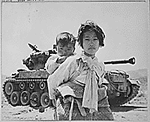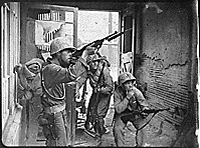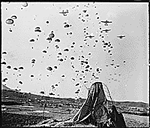Back to Catholics in Time of War
Catholics in Time of War
Korean War
 Given the Catholic Church's historic opposition to Communism, Catholics in the United States were among the most stalwart supporters of the country's participation in the United Nations' military action in Korea, 1951–1953. The move was supposed to stop the spread of Communism into Korea, but ended with a truce that, in an arrangement that persists to the present, divided the country into a democratic South and a
Given the Catholic Church's historic opposition to Communism, Catholics in the United States were among the most stalwart supporters of the country's participation in the United Nations' military action in Korea, 1951–1953. The move was supposed to stop the spread of Communism into Korea, but ended with a truce that, in an arrangement that persists to the present, divided the country into a democratic South and a  Communist North.
Communist North.
The early 1950s were an era of confidence in American Catholicism, and many believed that Church and country had reached a point of unprecedented compatibility. In this climate, the Korean conflict was, among American Catholics, perhaps the most widely supported and least resisted among all the nation's wars. Cardinal Francis Spellman of New York prominently endorsed American military efforts,  making publicized visits to the front lines.
making publicized visits to the front lines.
Sandwiched between the historic events of 1939–1945 and the divisive and sensational Vietnam conflict, Korea has been dubbed the "forgotten war." Yet hundreds of thousands of Catholics served in the Korean theater, and many were among the more than 30,000 Americans killed in battle. The war had a lasting impact on the people of East Asia, on Cold War American politics, and on the American soldiers and families touched by it.
Photos courtesy of National Archives and Records Administration (unrestricted)
Catholic war memoirs